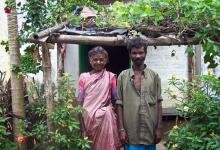If you give an orangutan a screwdriver, chances are he will open up his cage and walk away.
Orangutans are the largest living arboreal animals and live in the rainforests of Borneo and Sumatra. They are well adapted to living in trees, with long arms, long fingers, opposable thumbs/big toes set lower down their hands/feet so that they can better grasp branches, with fully rotational hip joints that allow them to swing in all directions.
The orangutan is probably the most intelligent of all of the great apes, especially if intelligence is measured by the ability to problem-solve. “A chimpanzee doesn’t have the patience,” Michelle Desilets says, “and a gorilla doesn't seem to have the motivation to problem solve. But the orangutan tends to have the incentive to determine the problem and sit and work at it until it's solved.”

The orangutan is probably the most intelligent of all of the great apes, especially if intelligence is measured by the ability to problem solve. (Credit: Michelle Desilets)
She sums up their differing approaches, noting that “if you give a chimpanzee a screwdriver, he'll break it; if you give a gorilla a screwdriver, he'll toss it over his shoulder; but if you give an orangutan a screwdriver, he'll open up his cage and walk away.” She also provides examples of orangutan innovation, such as their tactic for staying dry. Because orangutans detest rain, they’ll often use leaves to craft umbrellas or construct roofs over their nests.
Desilets has worked on orangutan conservation alongside Lone Dröscher Nielsen, the internationally well-known champion of these apes, for over 15 years.
Laurel Neme: What does the name, orangutan, mean?
Michelle Desilets: The name “orangutan” comes from the Malay language. It’s two words: “or-ang” meaning person or people; and “u-tan” is forest. So, quite literally, person of the forest. The natives believed that orangutans were at one time a form of humans that took to the trees and pretended not to be able to speak in order to avoid being put to work. They could just play in the trees if they pretended they couldn't talk.
There are still some amongst the many different Dyak tribes who have a remnant feeling that there is something about orangutans that makes them human, or at least almost seem it, and that they deserve a certain level of respect.
Laurel Neme: What's special about orangutans?
Michelle Desilets: We know that, evolutionarily speaking, the orangutan is not quite as close to us as the chimpanzee, and probably the gorilla on the evolutionary tree. If we look at the DNA, [chimpanzees are] almost 99% identical to human, whereas orangutans aren't quite that much but it is still quite close. So, orangutans share a lot of the features of human beings. They’re one of the great apes. They have no tail.
Laurel Neme: How intelligent are orangutans compared to other apes?
Michelle Desilets: There are lots of ways of measuring intelligence of species. Scientists have done different tests, but most recently, about a year or two ago, some scientists came together and said "if intelligence is measured in the ability to problem-solve, then the orangutan wins hands down. It just blows the chimpanzee right off the block". Orangutans just have this tenacity. They are motivated to focus on the problem until they solve it. They stick with it.
Laurel Neme: How does that compare to chimpanzees and gorillas?
Michelle Desilets: A chimpanzee doesn’t have the patience, and a gorilla doesn't seem to have the motivation to problem solve, but the orangutan tends to have the incentive to determine the problem and sit and work at it until it's solved.
They say that if you give a chimpanzee a screwdriver, he'll break it; if you give a gorilla a screwdriver, he'll toss it over his shoulder; but if you give an orangutan a screwdriver, he'll open up his cage and walk away. I do believe the orangutan is the most intelligent species [of great ape].

A recently confiscated orangutan, Pooh, now safe at BOS Nyaru Menteng Project. (Credit: Lone Dröscher Nielsen)
Laurel Neme: What are the main threats to orangutans? It seems there are three main ones: the pet trade; the logging industry destroying their habitat; and the palm oil industry.
Michelle Desilets: That’s right, and they're all inter-connected. Basically, Sumatra and Borneo are like “the new frontiers”. They are not highly populated because they are quite wild and uninhabitable for humans. But neighboring islands, such as Java, are overpopulated. The Indonesian government has transmigration projects that move communities into these areas and use them as the work force to exploit the natural resources that are found on these two islands. So, population growth, and the need for these countries to economically grow and have products they can sell, drives a lot. We can’t deny them that development opportunity. We can hope that it’s developed in the most sustainable way possible.
So, [governments are] moving people into these areas, and bringing in large multinational companies, often Chinese, Malaysian and others, into areas such as Kalimantan and other areas first of all to [extract] hard wood – that is, the timber used to make your patio furniture and door frames – which will be sold in the West at a premium. It’s a very strong, beautiful wood that comes out of the forest of Southeast Asia. At the same time, there’s a huge amount of illegal logging that goes on in both of these areas, in Sumatra and Borneo, and that’s costing the Indonesian government quite a lot of money in lost revenue.
This is an excerpt from Laurel Neme’s podcast.
FOLLOW US

STAFF BLOGS
Chilli Padi
VIVIENNE KHOO
Couch Potato
ASIA!NS
Field Notes
DEBBY NG
From Jerusalem to the West Bank
DAN-CHYI CHUA
Words and Letters
CLARISSA TAN











